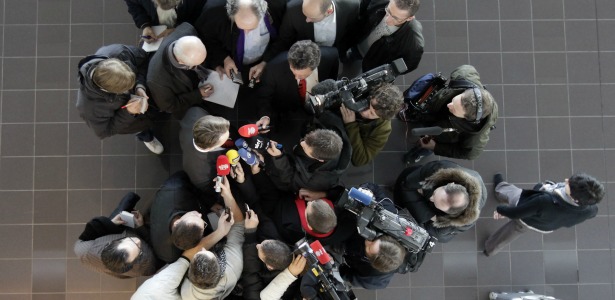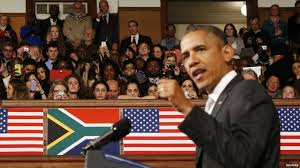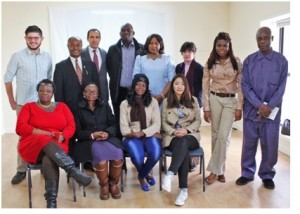When Mitt Romney’s pollster Neil Newhouse, said recently that “we’re not going to let our campaign be dictated by fact-checkers,” it was clear that truth will be the greatest casualty of the 2012 campaign season. There’s been a lot of sound and fury over Republican vice-presidential nominee Paul Ryan’s speech at the party’s national convention, and how it was riddled with inaccuracies, or what some prefer to call “demonstrably misleading assertions.” Is it news that a politician on the campaign trail would shade the truth, or use underhanded rhetorical tactics? Probably not, but the Ryan speech touched off a powder keg of emotion around the role that the traditional press plays in such acts of political theater, and whether the mainstream media deliberately downplays those kinds of falsehoods. If nothing else, such incidents show that the process of fact-checking and claim-debunking has to be distributed as broadly as possible — particularly to non-traditional sources.
As Andrew Beaujon at Poynter describes in a post about the response to Ryan’s speech, the Republican VP’s comments about what President Obama did or didn’t do appear to have set a new high-water mark for political fabrication and there have been a series of prominent fact-checking pieces that have taken the speech apart piece by piece to demonstrate that — including one at Salon magazine, and even one at Fox News. A special news app the Washington Post built even allows readers to watch the video and go through the speech line-by-line, with fact-checks inserted.
The Washington Post also did a feature on the entire first night of the convention, awarding the Republican party “four Pinocchios” — complete with graphics of the long-nosed puppet — for their repeated distortions of a quote from President Obama. And of course there were reports from the traditional fact-checking outlets Politifact and FactCheck.org, which also noted the vast discrepancies between Ryan’s comments and the truth. Tthe Huffington Post notes that many reporters were publicly calling out Ryan’s distortions and untruths on Twitter during the speech: “this new debt commission Ryan is extoling? Ryan was on it and voted against its report”.
The New York Times ran a piece about Ryan’s speech that didn’t pull any punches about the mis-statements contained in it, saying up front that the candidate “made several statements that were incorrect, incomplete, or incompatible with his own record in Congress.” A number of observers praised it for being devoted to unambiguous fact-checking — as opposed to the kind of fake balance that Rosen has complained about in what he calls the “View From Nowhere,” where even the most absurd claims are treated as equally deserving of space as the truth.
Has political journalism changed? Not really
So if all of this has been happening — along with repeated fact-checking of Mitt Romney’s comments and ads by the campaign — can we be satisfied that traditional media outlets are doing the job, along with dedicated sites like Politifact and FactCheck.org? Not really. If anything, the fact that all of this checking is being noticed and publicly applauded reinforces the reality that it is still an unusual activity. The response from CNN’s political host Wolf Blitzer, which Glenn Greenwald describes in a seething post at The Guardian, is typical of the reaction that speeches like Ryan’s get from many outlets, even when they are riddled with lies.
As New York magazine writer Frank Rich pointed out in an interview on Reddit as part of that site’s “Ask Me Anything” feature (which the president took part in on Wednesday in a historic first), even having special reports or features that focus on “fact checking” is an admission that fact-checking doesn’t occur during the regular process of reporting many news stories. As he puts it:
“It is embarrassing (and depressing) that “fact-checker” is now a journalistic gimmick rather than part of the actual process of reporting stories as they emerge… We have lived in the age of Truthiness ever since the Bush administration successfully sold a war in Iraq on pure fiction, which much of the press, including nearly all the major journalistic institutions, going along for the ride. For all the soul-searching that followed that journalistic debacle, I’m not sure that much has changed, sadly.”
The public editor of the New York Times triggered an earlier flame-war over this phenomenon when he asked in a column whether readers expected reporters for the paper to be “truth vigilantes” who challenged candidates and politicians directly on their untrue statements — and the most common response seemed to be shock and outrage that the newspaper hadn’t already been doing exactly that. But as former newspaper editor Dan Conover noted in a recent post, fact-checking of the political kind (as opposed to hard facts like place names or dates) requires a newspaper or journalistic outlet to have a firm position, and that’s not something objective journalists are supposed to do:
“Until a media company rejects the ‘fair and balanced view from nowhere’ that we called ‘journalistic objectivity,’ it simply can’t independently evaluate anything. Just as surveyors must establish a reference point before they begin measuring property lines, so too must journalists find and announce a meaningful perspective before they attempt to measure truth.”
James Fallows at The Atlantic says he is hopeful that in the response to Ryan’s speech, we are seeing the construction of a mainstream press that can cope with what he calls “post-truth politics.” But part of the problem is that once the election campaign is over, even many political journalists will likely go back to the way they used to write and report and think about their coverage, because the source of the most egregious kinds of obvious lies — politicians campaigning for election — will be gone.
Why can’t we have the kind of fact-checking we’ve seen over the past few days all the time? Some newspapers are trying to build tools with which to do that, like the Washington Post‘s “Truth Teller” project, for which it got financing from the Knight Foundation. But more than anything, we need more sources that are willing to call a lie a lie — which is what blogs and alternative sources like Reddit are good at, since they don’t feel a compulsion to adhere to the “view from nowhere” — and more traditional media outlets that are willing to look outside their own newsrooms.

By Mathew Ingram






